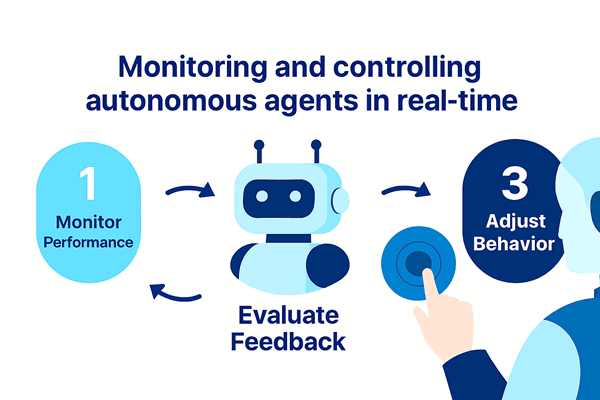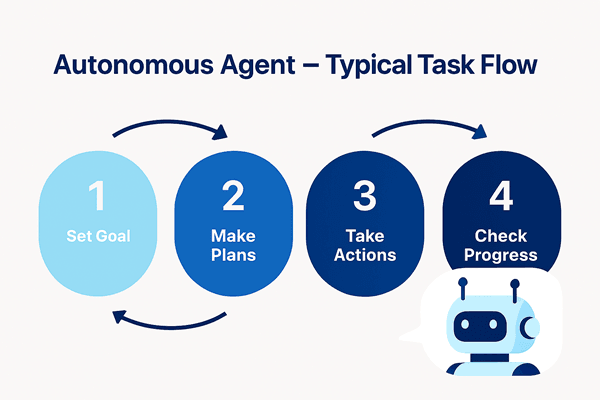How Agentic AI is Changing the Game
Exploring the rise of autonomous agents in AI: what they are, real use cases, risks, and a practical guide to building them.

Introduction
Agentic AI represents a new class of AI systems capable of autonomous planning, reasoning, and executing tasks without constant human guidance. These agents are reshaping how software interacts with the real world, from customer service automation to complex decision-making processes.
Agentic AI is goal-driven and can proactively perform sequences of actions, making it more powerful than standard reactive AI.
What Are Autonomous Agents?
Autonomous agents are software entities that operate independently:
- Monitor their environment
- Make decisions based on objectives
- Adapt strategies over time
These agents are multimodal, capable of processing text, images, audio, and other inputs simultaneously.

Monitoring and controlling autonomous agents in real-time

Typical task flow for an autonomous agent
Real Use Cases
1. Customer Support Automation
- AI agents can handle complex queries without human intervention.
- Seamless escalation when human judgment is required.
2. Enterprise Workflow Management
- Agents monitor deadlines, trigger notifications, and update databases automatically.
- Integration with APIs and internal systems for end-to-end automation.
3. Research & Data Analysis
- Agents collect, analyze, and summarize large datasets.
- Can recommend actions based on predictive models.
Some companies report up to 50% efficiency gains by deploying agentic AI for routine tasks.
Building Agentic AI
Building an autonomous agent requires defining its goals, planning mechanisms, and execution logic. Below is an example of an autonomous agent implemented in JavaScript, integrating with an external API for task execution:
class Agent {
constructor(name, goals, apiKey) {
this.name = name;
this.goals = goals;
this.apiKey = apiKey;
this.status = "idle";
}
async plan() {
console.log(`Planning for ${this.name} with goals: ${this.goals}`);
// Example: Break down goals into actionable steps
return this.goals.map(goal => ({
task: goal,
status: "pending"
}));
}
async execute(plan) {
this.status = "executing";
for (const task of plan) {
try {
// Simulate API call (e.g., to a data processing service)
const response = await this.callExternalAPI(task.task);
task.status = "completed";
console.log(`Task ${task.task} completed: ${response}`);
} catch (error) {
task.status = "failed";
console.log(`Task ${task.task} failed: ${error.message}`);
}
}
this.status = "idle";
}
async callExternalAPI(task) {
// Placeholder for API integration (e.g., REST or GraphQL)
return new Promise((resolve) => setTimeout(() => resolve(`Processed ${task}`), 1000));
}
async monitor() {
console.log(`Monitoring ${this.name} - Status: ${this.status}`);
// Evaluate progress and adapt (e.g., retry failed tasks)
}
}
// Usage
const agent = new Agent("DataAnalyzer", ["Fetch dataset", "Analyze trends"], "your-api-key");
agent.plan().then(plan => agent.execute(plan));To build robust agents, consider using frameworks like LangChain for natural language processing or AutoGPT for task automation. Ensure API integrations are secure and include error handling for resilience.
Risks and Ethical Considerations
While agentic AI is powerful, it introduces new risks:
- Autonomy risks: Agents might act unexpectedly if goals are misaligned.
- Security risks: Malicious exploitation of autonomous workflows.
- Ethical risks: Bias amplification or unsafe decision-making.
Mitigate risks by implementing goal alignment, sandboxed testing environments, regular audits for bias, and fail-safes like human-in-the-loop validation.
Future Trends
- Multimodal agents: Combining text, vision, and audio understanding.
- Agent orchestration: Teams of agents collaborating for complex tasks.
- Adaptive learning: Agents improving through feedback without retraining from scratch.
Conclusion
Agentic AI is more than just automation. It’s a shift toward AI systems that can reason, plan, and act independently, opening opportunities across industries. Proper design, monitoring, and ethical consideration are key to safely unlocking their potential.


